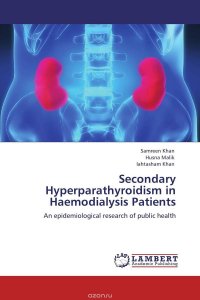Secondary hyperparathyroidism (SHPT) develops frequently in patients with “End Stage Renal Disease” because the production of 1, 25 (OH) 2- vitamin D (calcitriol) decreases in the kidneys. That’s why patients may develop osteodystrophy or osteomalacia. The functional role of vitamin D3 under normal body condition is to regulate secretion of parathyroid hormone (PTH) synthesis and release. Parameters such as calcium, phosphate and vitamin D3 act upon PTH. In normal subjects, the homeostasis of these parameters is strongly interconnected but in renal failure, the metabolism of each of these parameters may be deregulated. The diseased kidney is unable to produce vital hormone that is called erythropoietin which increases synthesis of red blood cells. The anemic condition is seen in CKD (chronic kidney disease) because erythropoietin production become reduced. In Pakistan, CKD patients are continuously increasing annually. We conducted a blood and serosurvey study in Lahore metropolitan city of Punjab, Pakistan to see the co-relation between SHPT and CKD. This epidemiological research of public health will be beneficial for onward broad demographic surveillance programs. Это и многое другое вы найдете в книге Secondary Hyperparathyroidism in Haemodialysis Patients (Samreen Khan,Husna Malik and Iahtasham Khan)
Secondary Hyperparathyroidism in Haemodialysis Patients Samreen Khan, Husna Malik and Iahtasham Khan
Подробная информация о книге «Secondary Hyperparathyroidism in Haemodialysis Patients Samreen Khan, Husna Malik and Iahtasham Khan». Сайт не предоставляет возможности читать онлайн или скачать бесплатно книгу «Secondary Hyperparathyroidism in Haemodialysis Patients Samreen Khan, Husna Malik and Iahtasham Khan»
